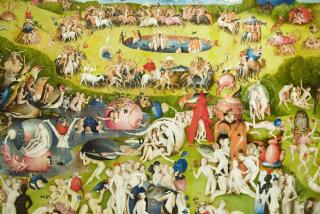Le Carre Goes Native : Hunting for a romantic on the grand scale : OUR GAME: A Novel, <i> By John le Carre (Alfred A. Knopf: $24; 302 pp.)</i>
- Share via
Call it luck or divination, but John le Carre’s new novel has caught a tail wind from the headlines on its way to the public. “Our Game’s” plot hinges on a rebellion against Moscow in a breakaway enclave of the former Soviet Union--Ingushetia, to be exact, an ethnically distinct region of the same ex-Soviet republic now better known to Westerners from the predicament of another of its independence-minded minority populations: the Chechens. But since this is Le Carre, the story naturally opens far from Ingushetia, at the country retreat where narrator Tim Cranmer, swept into early retirement by the new brooms at the British Secret Service, has been keeping himself occupied since the Cold War ended by cultivating a wayward vineyard along with a not much more dependable love affair.
Cranmer belongs to a type that the later Le Carre books have increasingly nudged toward center stage. He’s an intelligent weakling, compromised by choices he’s been perceptive enough to doubt but not refuse, whose moral sense operates at a fatal disconnect from his behavior. His name gives a hint of what his creator’s up to, since Thomas--not Timothy--Cranmer was the cleric who put the crown above his faith when he sanctioned Henry VIII’s separation from (not to mention of) Anne Boleyn. Nor do the religious allusions end there. Cranmer’s favorite refuge, crammed with archival memorabilia providently filched from his former employers, is a secret warren that he’s dubbed his “priest-hole,” hidden in the tower of an abandoned church on his land.
One night, the police show up at his door. An old associate of Cranmer’s has vanished; what does he know about it? More than he chooses to tell them. Larry Pettifer, the missing man, is both a friend dating back to Cranmer’s school days, and his former agent; he’s the man Cranmer recruited to pose as a Soviet sympathizer for his service’s benefit and ran throughout the Cold War once the KGB, coming in on the losing end of this ploy for the first time in Le Carre’s work since “The Spy Who Came In From the Cold” took the bait.
Through an ongoing narrative mutter of interpolated asides and flashbacks--the kind of scatted exposition that Le Carre always manages so skillfully--we’re given a portrait of an impossible, scapegrace charmer, the impetuous id to Cranmer’s clenched superego. Yet Larry the spy is also Cranmer’s creature, if not his creation: “You stole my life,” says Pettifer, in the narrator’s troubled memory.
There’s more troubling Cranmer than he’s willing to confide even to the reader, at least right off the bat. The discrepancies and omissions in what he’s telling us, barely noticeable at first, gradually turn into signposts pointing toward Pettifer’s magnetic effect on Cranmer’s lover Emma, and Cranmer’s own desperate reaction--although he isn’t sure what actually happened.
The authorities may not know the whole story either, but Pettifer’s still more to them than just another missing person. He is suspected of having been the British end of a high-stakes scheme to bilk Moscow’s treasury out of millions, in cahoots with the same KGB controller he duped for so long when Cranmer was his puppet-master. But in the Pandora’s box of reconfigured loyalties flung open by the Soviet Union’s breakup, the vital fact is that the KGB man, Checheyev, isn’t Russian but Ingush. Once Cranmer, by now conducting his own unsanctioned, guilt-goaded investigation, uncovers Larry’s sudden interest in arms sales, he realizes that he isn’t hunting for a mere swindler. He’s hunting for a romantic on the grand scale.
Up to this point, “Our Game” is likely to convince you that Le Carre has bounced back from the aimless dithering of “The Russia House” and “The Secret Pilgrim,” and particularly from the silly “The Night Manager,” whose tone embarrassingly took for granted a loftiness of meaning and purpose that the implausible, cliche-riddled story didn’t back up. Many scenes and passages in the new novel hit familiar chords with beguiling ease; there’s a long, carelessly virtuoso sequence of bureaucratic flimflam when Cranmer gets hauled in by his old office for a chat, and the obstreperous club types and sour Foreign Office timeservers the narrator cajoles into divulging bits of Larry’s puzzle add up to a typically disenchanted portrait of Britain’s ruling classes.
While most readers consider this to be Le Carre’s best vein, Le Carre unfortunately disagrees. Once he closes in on his theme of the Ingush cause, and begins to amplify the symbolic underpinnings of Larry’s role as Cranmer’s other half, “Our Game” turns dismayingly diffuse, mawkish, overly earnest, and moony.
You’d expect Le Carre to be more skeptical than he is about the gallantry of Englishmen who embrace foreign causes. Pettifer is compared to his fellow knights-errant T.E. Lawrence and Lord Byron, but--a bit startlingly for our day--the parallels are offered as endorsements, not criticisms. The author’s self-knowledge isn’t measurably more acute than Larry’s. When the locale finally shifts to Moscow and then the Caucasus, and the Ingush rebels appear, they’re dignified and noble, dispensing gruffly heroic aphorisms as they pose against the scenery; it’s the revolt of the cigar-store Indians.
Le Carre’s admiration for their struggle is plainly genuine, and his outrage at Western complacency understandable. Yet he also has no qualms about borrowing Ingushetia’s plight to tell a story about an Englishman’s redemption, a skewing of priorities that amounts to making the same mistake in fiction that Byron and Lawrence did in life. He was once tough-minded enough to appreciate that the acts of defiant individualism his books celebrated--Leamas coming in from the cold, the Honorable Schoolboy retrieving his honor--were futile, and he cherished them all the more for that. Now he offers them up as a program for our salvation, and his style has developed a fulsome throb in its throat to match.
Here’s Cranmer’s lover Emma, one more of Le Carre’s enigmatic waifs, on a typical jag: “Make me one person, Tim,” she implores the narrator. “I’ve been too many people for too long, Tim. Be my one-man convent, Tim, my Salvation Army. Never let me down.” With all allowances made for poetic heightening, that’s still pretty damned chewy pillow talk; she sounds like a blast in bed.
I doubt that Le Carre could describe a woman convincingly if she’d just stolen his wallet. He’s on somewhat surer ground with the central male relationship; the zigzagging bond between Cranmer and Pettifer, half-rivalry and half-romance, has been elegantly worked out, with metaphors of death, resurrection, exchange and conversion carefully embedded in the story-line. At one point, someone tells the narrator, a bit too wisely, “I don’t think you wish to find your friend, only to become him.” Even Cranmer’s abandoned church has a twin in Ingushetia. Yet all Le Carre’s sophistication can’t hide the fact that, despite the layers of anguished resonance he freights it with, at bottom this is the familiar Clara-and-Heidi story of a repressed soul who’s opened up by contact with a free spirit and learns to be uninhibited and so forth. Plenty of Le Carre fans are sure to feel that they deserved better from him than that--and just conceivably, the Ingush will, too.
More to Read
Sign up for our Book Club newsletter
Get the latest news, events and more from the Los Angeles Times Book Club, and help us get L.A. reading and talking.
You may occasionally receive promotional content from the Los Angeles Times.










